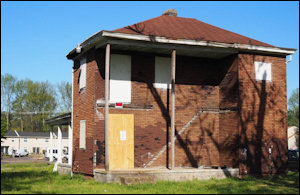
Henrico County has a huge problem with encroaching slums that it has only recently begun to acknowledge and deal with. According to county data published in the Richmond Times-Dispatch today, 57,000 properties — about 54% of all parcels in the county — will be eligible to apply for a tax abatement program designed to combat blight.
The previous tax-abatement program applied only to property owners with homes assessed for less than $250,000 and older than fifty years. In a vote yesterday, the Board of Supervisors expanded the tax abatements, lifting property taxes on improvements for 10 years, up from seven, for certain residential properties, and making it easier for commercial and industrial properties to participate.
“We’re trying to boost up incentives for people to reinvest in their homes and build up neighborhoods,” said Director of Finance Ned Smither. “In general, we are seeing more commercial and residential properties that need to be more dressed up.”
Unfortunately, the cure may be worse than the disease.
As a Henrico County resident, I find it appalling that more than half the properties in the country are deemed blighted or at risk of being blighted. But I’m not surprised. For more than two decades I have been predicting the spread of decay from the City of Richmond into Henrico and Chesterfield Counties as the urban core gentrifies and pushes poor people into neighboring suburbs. Poverty in the Richmond metropolitan area, as with most metros across Virginia and the United States, is increasingly a suburban phenomenon, driven by the fact that poor people are migrating from neighborhoods with rising property values (compared to the metropolitan average) in the urban core into neighborhoods with declining property values, primarily ’50s- and ’60s-era suburban tract housing that has lost its appeal.
In the past, I’ve thought of tax abatement programs like Henrico’s as a useful tool for encouraging reinvestment in declining neighborhoods. But I’m re-assessing my thinking now.
First, the old tax-abatement program, as generous as it was, had so few takers. According to Smither, only 145 residential properties had been granted exemptions, amounting to a total of $85,000 annually in tax savings. That implies a grand total of about $1 million in renovations, a paltry sum for a county as populous as Henrico. The numbers tell me that the program was not having the hoped-for effect. Will more extensive tax breaks be any different? I’m dubious.
Second, if the program against all odds worked out as hoped, it would create a new problem. By extending tax rebates to more than half of its real estate parcels, the county risks hollowing out its tax base.
We need to think differently. What if it were possible to revitalize decaying neighborhoods and commercial districts without any tax abatements at all? How cool would that be?
Well, there might be a way, at least in selected areas: Re-zone properties to allow mixed-use development at higher densities. There is little market demand for small, aging ranch houses in cul de sac subdivisions in unwalkable neighborhoods. Nobody wants to live in such places anymore. They do so for one reason only: because housing is cheap. Granting tax abatements in the City of Richmond makes sense because it encourages property owners to invest in historic properties in walkable neighborhoods where people do want to live. Incentivizing investment in decaying, unwalkable neighborhoods flies in the face of market realities. The prospect of saving a few hundred dollars a year in property taxes will not induce property owners to plow money into declining neighborhoods where they have no hope of recouping their investment.
No one is applying to convert decaying neighborhoods into mixed-use projects because getting exemptions from Henrico’s antiquated zoning code is such a god-awful nightmare. Henrico is in the process of redesigning its zoning code, however. Hopefully, the new code will loosen restrictions that inhibit the recycling of aging and obsolete land use patterns into the kinds of places where people want to work, live and play.

Leave a Reply
You must be logged in to post a comment.